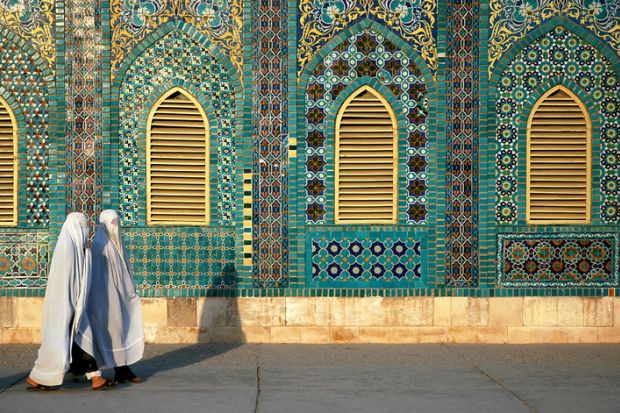University enrolment in Afghanistan has fallen by more than half since the Taliban takeover and the subsequent ban on education for women, according to new figures from the United Nations Educational, Scientific and Cultural Organization (Unesco).
In December 2022, the Taliban banned women from attending university in a widely condemned move.
Since the takeover, the number of students enrolled in the country’s universities has decreased from 430,000 to 200,000 as female students were forced to abandon their studies, Unesco says.
Speaking anonymously for fear of reprisals, one student told Times Higher Education that she had dropped out of university as a result of the ban, destroying her plans to become a doctor.
“I always dreamed of becoming a cardiologist,” she said. “But now that dream feels impossible, and I’ve lost hope for the future. I studied day and night to get into medical school, but couldn’t attend.”
Ayesha Ahmad, reader in global health humanities at City St George’s, University of London, described the ban as “shattering”.
Dr Ahmad is one of many experts warning that the curbs on higher education, particularly in fields such as healthcare, will not only affect individual women but will also damage the development of the country, which is already facing a severe humanitarian crisis, including widespread food insecurity and a struggling medical system.
“Banning women from studying to become doctors or health professionals has also made accessing healthcare much more difficult,” Dr Ahmad said, with women allowed to see male physicians only in emergency situations.
Additionally, increased gender inequality spanning from curbs on female education “is a risk for increased prevalence…of domestic and gendered violence, including forced marriage”, she said.
In a statement, Unesco warned that the ban would also damage the country’s already weak economic growth. “The country will rapidly face a shortage of graduates trained for the most highly skilled jobs, which will only exacerbate development problems,” the body said.
Campus resource: How universities can support refugee students and academics
Despite the ban, some Afghan women have managed to find alternative routes to education. The former healthcare student was awarded a scholarship to study with online education provider University of the People. While she expressed her gratitude for the opportunity, she said she still faced challenges such as a poor internet connection.
“Many girls are struggling with mental health issues, and it’s heart-breaking to see,” she added. “Some of the girls I knew were brilliant and incredibly intelligent.”
Shai Reshef, president of the University of the People, said: “When half of a nation’s population is denied the opportunity to learn and contribute to society, the entire country suffers. Without educated women, Afghanistan’s economic, social and cultural development is curtailed and the country’s potential for peace and progress is seriously diminished.”
Mr Reshef said that free online education had been a “lifeline” for Afghan women and urged more universities to offer the same opportunities.
“Providing free online education opportunities is the best way to help Afghan women continue their educational journeys,” he said. “This is not just about providing access to education; it is about giving Afghan women the tools to reclaim their autonomy and providing them with hope for a better future.”
Register to continue
Why register?
- Registration is free and only takes a moment
- Once registered, you can read 3 articles a month
- Sign up for our newsletter
Subscribe
Or subscribe for unlimited access to:
- Unlimited access to news, views, insights & reviews
- Digital editions
- Digital access to THE’s university and college rankings analysis
Already registered or a current subscriber? Login








